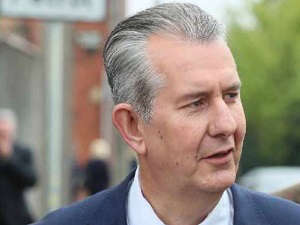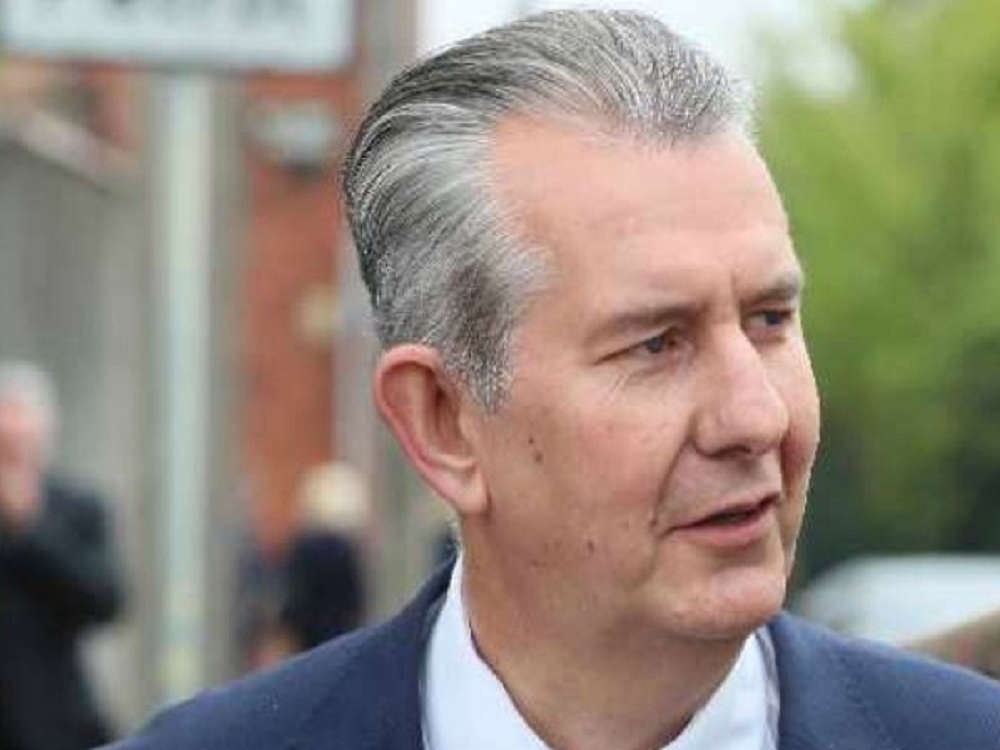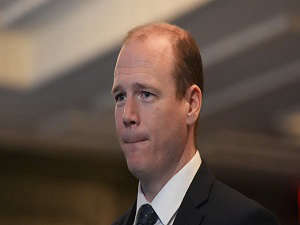
By Jonathan McCambridge, PA
A High Court judge has issued an interim order suspending a decision by Agriculture Minister Edwin Poots to direct a stop to Brexit agri-food checks at Northern Ireland ports.
Mr Justice Colton said he was making the temporary direction until a judicial review against the DUP minister’s decision can be heard in full.
DUP minister Mr Poots acted unilaterally this week to order a halt to port checks that are required under the Northern Ireland Protocol.
Civil servants have yet to implement the instruction, pending legal clarity on their obligations, and checks are continuing.
Mr Poots’ actions were challenged in two separate applications in the High Court in Belfast.
Mr Justice Colton granted applications for judicial reviews against the minister’s decision.
He said:
“There shouldn’t be any confusion hanging over those in the Civil Service, so I am persuaded this is a case where there should be interim relief.
“I therefore make the order to suspend the instruction given by the minister for agriculture until further order of this court.”
The judge pointed out that the checks had been ongoing for more than a year and that the order to halt them had been brought at short notice.
A barrister for one of the complainants raised concerns that recent rulings in the High Court, concerning the attendance of DUP Ministers at cross-border meetings, had not been complied with.
Mr Justice Colton said:
“Maybe I am naive but this court works on the premise that ministers obey the rule of law and accept the judgments of courts.”
A barrister for the Department of Agriculture told the court that their position was that the direction by Mr Poots was “entirely lawful”.
The full judicial review is expected to be heard next month.
Meanwhile, the DUP would have difficulty reforming a Stormont executive after the upcoming Assembly election if issues with the Northern Ireland Protocol are not resolved, its party leader has warned.
Sir Jeffrey Donaldson expressed doubts about the prospect of a short-term return to a fully-functioning devolved administration in the wake of the resignation of his party’s First Minister Paul Givan.
Sir Jeffrey’s decision to pull Mr Givan out of office is part of the DUP’s escalating protest strategy against the post-Brexit trading arrangements that have created economic barriers between Northern Ireland and the rest of the UK.
Mr Givan’s resignation, which came into effect at midnight, automatically removed Sinn Fein deputy First Minister Michelle O’Neill from her position.
Other Stormont ministers can remain in post but the Executive can no longer meet and is unable to take significant policy decisions.
An Assembly election is already scheduled for May.
Mr Givan’s departure raises the prospect of that poll being brought forward several weeks.
A fully functioning administration could only be formed following the election if the positions of first and deputy first ministers are filled by the largest unionist and largest nationalist parties.
Sir Jeffrey suggested the DUP would only return to an executive if its concerns around the post-Brexit trading arrangements are addressed.
“I’ve withdrawn the First Minister on the basis that the protocol issues have not been addressed despite clear commitments and promises given by the Prime Minister that they would be addressed, and clearly if the protocol issues are not resolved by the time of the election then, of course, it is difficult for us to form a government because of the instability that the protocol creates,” he told BBC Radio Ulster.
“I have made my position clear – I think there is now an opportunity for the Government and the EU to step up.
“The EU said consistently that the purpose of the protocol was to protect the political institutions, political stability and the Good Friday Agreement.
“Well, we know that isn’t happening because unionists do not consent to the protocol.
“There is no consensus for the protocol.
“There is now an opportunity for the UK Government and the EU to step up to the mark and to deliver an agreement that resolves these issues that can be done quickly.”
Sir Jeffrey insisted there is still a point in having an Assembly poll.
“I think the time has come for the people of Northern Ireland to have their say,” he added.
Announcing his resignation on Thursday, Mr Givan said the protocol had undermined a cornerstone of powersharing in the region, governance with the consent of both nationalists and unionists.

(Edwin Poots)


 Pensioner, 82, killed in crash near Omagh
Pensioner, 82, killed in crash near Omagh
 Kneecap announce new song ahead of headline performance at London’s Wide Awake
Kneecap announce new song ahead of headline performance at London’s Wide Awake
 Gordon Lyons to attend first GAA match as Stormont Communities Minister
Gordon Lyons to attend first GAA match as Stormont Communities Minister
 Fresh appeal over 1973 murder of 18-year-old whose body was found in quarry
Fresh appeal over 1973 murder of 18-year-old whose body was found in quarry
 Kneecap say terror charge is ‘carnival of distraction’ and ‘political policing’
Kneecap say terror charge is ‘carnival of distraction’ and ‘political policing’